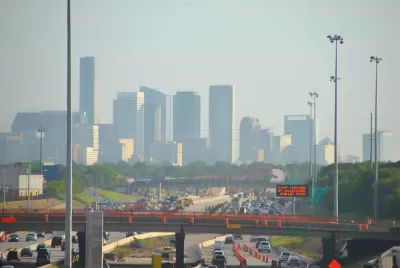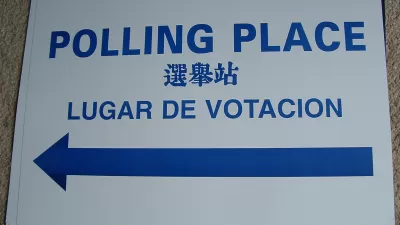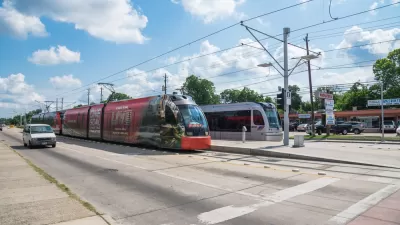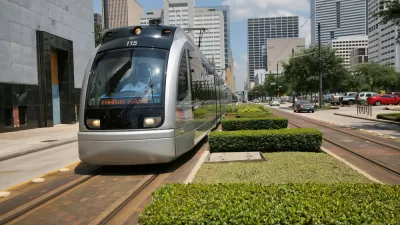The executive director of Environment Texas makes the case for public transit as a key tool in improving air pollution in and around Houston. Houston voters will vote on the MetroNext bond referendum today.

Cars are responsible for an increasing number of bad air days in Houston, according to an op-ed by Luke Metzger, and it's time for the city to focus on cleaner transportation alternatives.
Continuing to double down on costly car-centric infrastructure will only induce more demand for driving and lead to more pollution and congestion, as the expansion of the Katy Freeway years ago proved. Because Houston can’t prosper without clean air, we must clean up the way we get around. And Houstonians can help do that by voting to approve Metro’s bond referendum on this November’s ballot.
If approved, the bond would provide $3.5 billion in funding to implement the MetroNext Moving Forward Plan.
MetroNext will include 75 miles of new bus rapid transit — fast, convenient service that works like light rail, with dedicated lanes and new stations. MetroNext will include 290 miles of “boosted” routes, which will keep buses moving and prevent idling. It will create 16 miles of new light rail, which is electric, and it will fund a 25 percent increase in local bus service, adding new routes and rebuilding stops with shelters and real-time passenger information, It also will enhance accessibility improvements to help people on foot and on bikes walk or ride to cover that first and last mile to and from stops.
The benefits to mobility are one reason to vote for the bond, according to Metzger, but improving the air in Houston is the main selling point. "With MetroNext, by 2040, Houston will see as many as 500,000 vehicle trips eliminated every day. That will reduce the region’s ground-level ozone pollution and our greenhouse gas emissions by 680,000 metric tons every year."
FULL STORY: Remember the dirty air you could see from afar? It’s still with us.

Alabama: Trump Terminates Settlements for Black Communities Harmed By Raw Sewage
Trump deemed the landmark civil rights agreement “illegal DEI and environmental justice policy.”

Planetizen Federal Action Tracker
A weekly monitor of how Trump’s orders and actions are impacting planners and planning in America.

Why Should We Subsidize Public Transportation?
Many public transit agencies face financial stress due to rising costs, declining fare revenue, and declining subsidies. Transit advocates must provide a strong business case for increasing public transit funding.

Judge Orders Release of Frozen IRA, IIJA Funding
The decision is a victory for environmental groups who charged that freezing funds for critical infrastructure and disaster response programs caused “real and irreparable harm” to communities.

‘Clybourne Park’ Sets Stage for Housing Equity Discussions
Clybourne Park, a play exploring race, real estate, and community tensions, can set the stage for discussion on the lasting impacts of housing discrimination, gentrification, and the fight for affordability.

Understanding Road Diets
An explainer from Momentum highlights the advantages of reducing vehicle lanes in favor of more bike, transit, and pedestrian infrastructure.
Urban Design for Planners 1: Software Tools
This six-course series explores essential urban design concepts using open source software and equips planners with the tools they need to participate fully in the urban design process.
Planning for Universal Design
Learn the tools for implementing Universal Design in planning regulations.
Caltrans
Smith Gee Studio
Institute for Housing and Urban Development Studies (IHS)
City of Grandview
Harvard GSD Executive Education
Toledo-Lucas County Plan Commissions
Salt Lake City
NYU Wagner Graduate School of Public Service





























